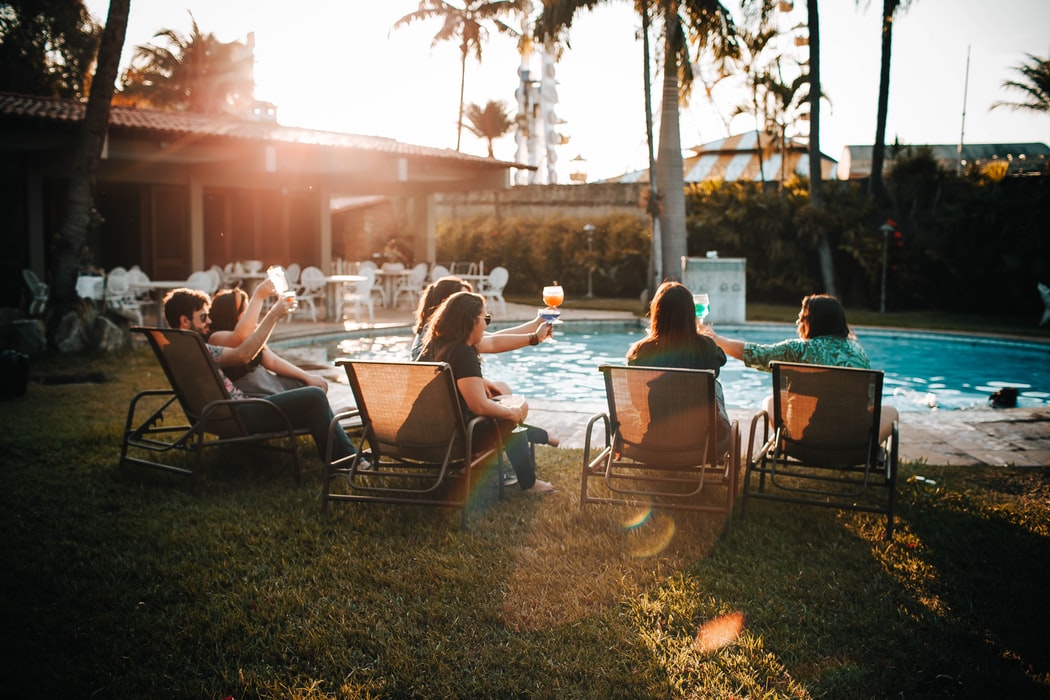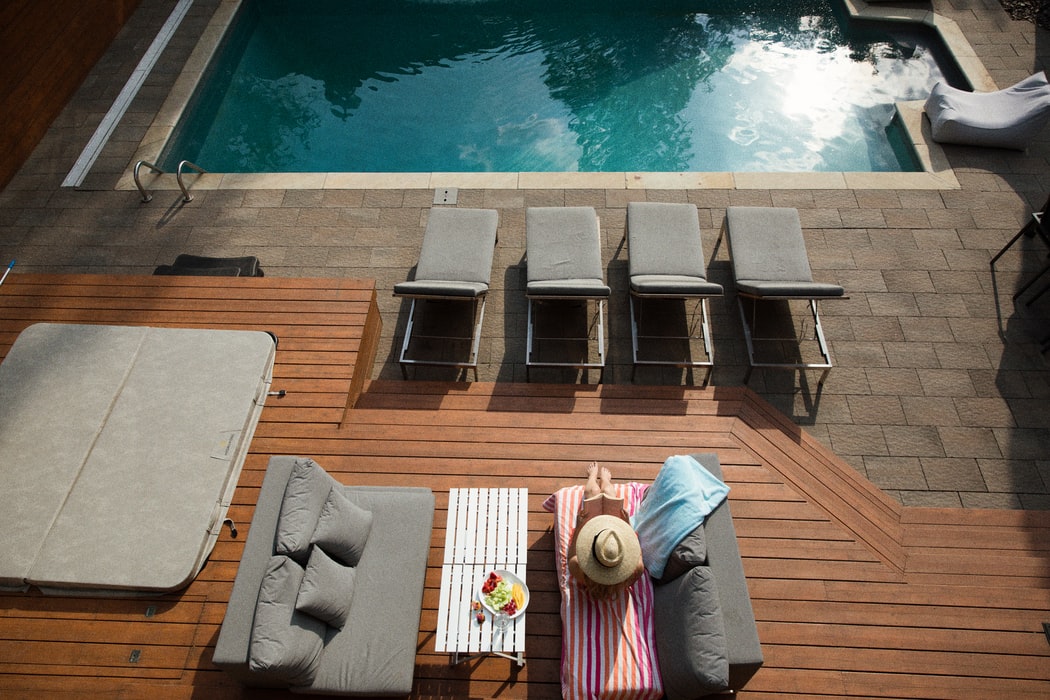
Right now, what do you think of when the term “hospitality sales” comes to mind?
You likely envision social media promotions, television commercials, and of course, the classic salesperson with a convincing spiel. Although these are all tried-and-true methods, if you ask us, they don’t hold a candle to the power of social selling.
Inbound marketing delivers up to 53 percent more leads monthly than traditional outbound marketing tactics. Even though TikToks and social media posts are all the rage, up to 83 percent of consumers still prefer article and video content over trendier pieces like podcast episodes or infographics.
Hospitality Sales Pros - Here's What You Need to Know
When people research hospitality businesses, they’re in the midst of planning something. Whether it’s their special anniversary dinner or their next family vacation, they’re doing research - and the best way to appeal to their buying process is to produce great sales content.
Content isn’t just important for hospitality marketing - it’s essential. Let us show you why.
Consumers Don’t Want to Deal with Salespeople
If you’re like the average traveler these days, you don’t want to waste your time speaking to a salesperson while evaluating all of your options. You’d much rather find quick, comprehensive answers to your questions online - without having to call.
Roughly 83 percent of travelers now prefer to book their vacations online. You can bet that most of those aren’t talking to salespeople on the phone while they make their decisions. In fact, in 2018, 82 percent of all travel bookings were made via a mobile app or website without any human interaction.
However, you shouldn’t mistake this dislike for salespeople interactions as a complete divergence from brand-consumer interactions. Your shoppers still want to hear from you - but in a different way.
One of the most successful hospitality trends we’ve seen over the years is the switch to more informative content versus promotional conversations with salespeople.
Instead of presenting a product-centric speech from your sales team, work on providing useful hospitality content that takes your brand further. This could include blogs, videos, how-to guides, and many other kinds of content that guide your patrons in the right direction. In other words, your direction.
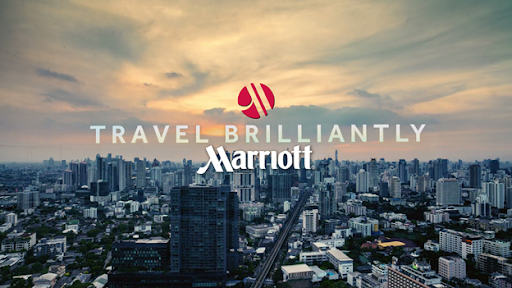
Image Source: Marriott
For example, take a look at Marriott’s brand blog, Marriot Bonvoy Traveler. Marriott is a brand that doesn’t need to introduce itself - everyone’s heard of it before. What it does need to do is show people that they have specialized expertise they can offer as a result of their high status.
That’s what their articles on the blog are all about. Rather than advertising their rooms or hotel features, Marriott posts articles such as “Holiday Roads: Where to Find Europe’s Ultimate Road Trip Vacations” or “How to Travel Germ-Free.”
The purpose of Marriott’s brand blog isn’t to sell. It’s to inform consumers. The more Marriott establishes itself as a resource for travel research, the more it convinces people to trust their brand when it comes time to make bookings.
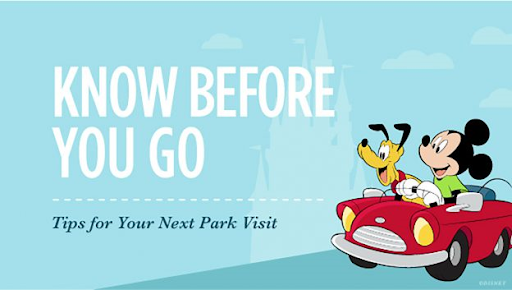
Image Source: Disney Parks
Disney theme parks have embraced a similar tactic. Although the giant brand still produces its fair share of TV commercials, ads, and sales pitches, they’ve adopted a more educational stance when it comes to content and hotel marketing.
When you visit the Walt Disney World Resort Blog, you don’t just find deals and promotions. Instead, you find helpful sources for trip planning. This could be anything from a post on what happens in the parks during the holidays to a blog on why smoking isn’t allowed in most areas of the resorts.
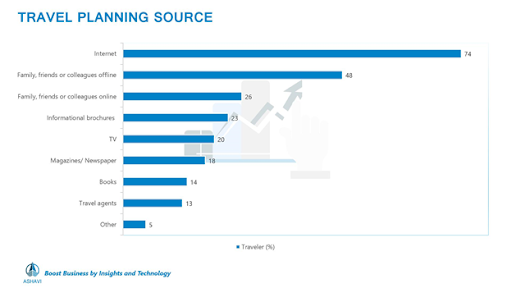
Image Source: Ashavi
Today, more people than ever are using the internet to plan their travel. This is the chance for your brand to serve as a research tool rather than just a source of advertisement.
Your hotel’s content might even serve as a more powerful resource than recommendations from friends, family, magazines, books, and other reliable sources. This is, it can if your content is worthwhile.
As you make plans for hospitality marketing during the rest of 2020, ask yourself this: am I providing my shoppers with valuable resources that facilitate their buying process? Or am I simply talking at them, convincing them that my brand is worth supporting?
Content Fosters Strong Consumer-Brand Relationships
We need to address the fact that content is one of THE best ways to forge strong relationships with your consumers.
The key to long-term success is developing purposeful relationships with a niche audience. As a hospitality brand, you need to show your shoppers that you care and that your company is more than just a place to eat or crash.
Any expert in people-based marketing will tell you that blogs, papers, and other forms of content give you the extra edge you need to create a bond with a consumer. Why? Because it helps trigger an emotional response to your brand’s services, products, and image.
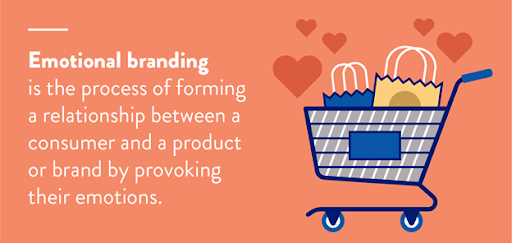
Image Source: Clever Tap
For example: let’s say that instead of running more Facebook ads for your brand, you write a story. This is a true story - one about a customer of yours who had a memorable, life-changing experience because of your brand’s offerings.
Which tactic is going to help a customer bond more with the concept of your brand: the ad or the compelling story? We think you know the answer.
One time, on a Spirit flight, instead of giving the usual sales pitch, a flight attendant told the passengers a story. She admitted that Spirit Airlines is a cheap, no-frills airline, but she also explained how it helped a Puerto Rican woman reunite with her family for the first time in decades because it was cheap and no-frills.
She spun potentially negative brand traits as positive strengths, all in a ten-minute story told to bored flight passengers.
You can bet that the passengers got off that plane feeling more connected to Spirit than they were previously. That’s the kind of power content can give your hospitality sales strategies. All you need to do is come up with content that really engages customers.
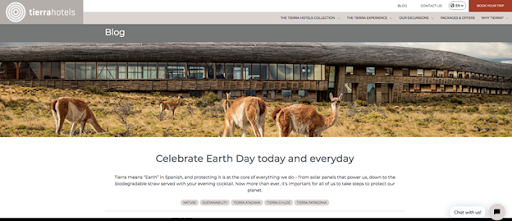
Image Source: Tierra Hotels
If you need some ideas to jumpstart your emotion-triggering content, start with:
- Stories from previous customers
- Posts that share your company’s values and mission
- News about your brand’s charitable donations/actions
- Articles that address issues head-on in a respectful manner
- Inside looks at how your brand functions or produces products/services
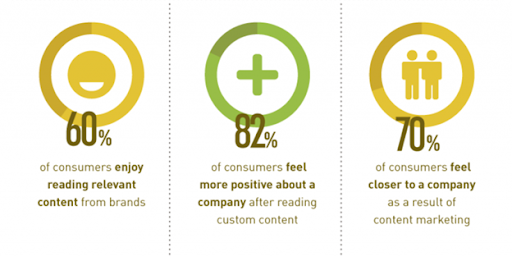
Image Source: Lyfe Marketing
At the end of the day, the goal is to connect with your customers on a closer level than advertisements can. Make them feel positive about your brand through relevant, engaging content. Draw them closer with valuable information, interesting stories, and more.
A strong relationship with one loyal traveler is more valuable than dozens of contacts with distant strangers.
You Need to Establish Credibility in Your Industry
Another big reason to focus more on content in your hospitality sales: it’s a great way to hang some skins on your wall. An essential aspect of sales is positioning your brand as an “expert.” Creating content helps you do just that.
It doesn’t matter if you’re talking about hotels or restaurants - you need to be credible. Where’s your company history? Success stories? Your testimonials? Your proof that you’re an authority on something?
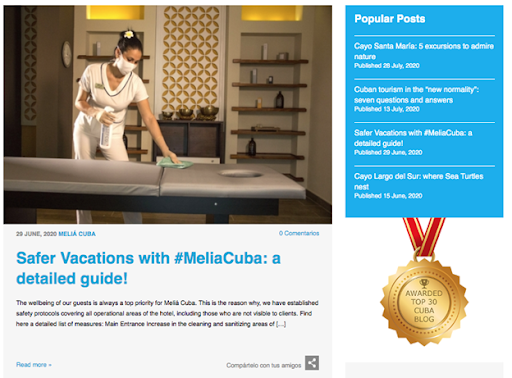
Image Source: Melia Cuba Blog
When you visit the Melia Cuba blog, you don’t just think, “Hey, that’s a cool hotel chain.”
Instead, you find a variety of Cuban tourism posts that make you say, “Wow, this brand knows their stuff.” That’s the goal right there: to promote your brand while simultaneously establishing yourself as an industry expert.
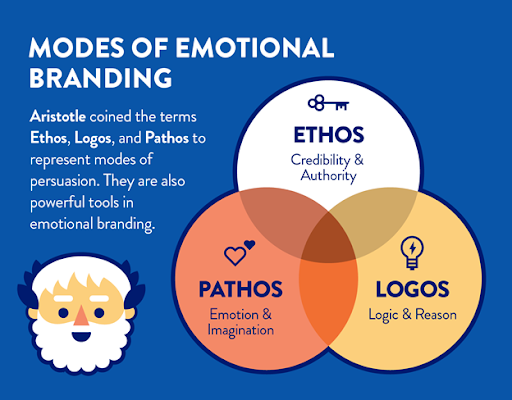 Image Source: CleverTap
Image Source: CleverTap
If you think about it, in this post, we’ve revealed how content can establish pathos (emotion) and logos (logic) through educational, compelling content. Now, we’re helping you fill in that third ring, ethos (credibility).
Content allows you to establish authority and create the trifecta of impeccable emotional branding.
Research in the Hotel Trust Index has revealed that most-trusted brands are Hilton, RIU Hotels and Resorts, Four Seasons and Resorts, and the Ritz Carlton. These are all well-known hospitality chains that have earned gold stars from consumers who support and believe in them.
So, what makes all of these brands so credible? Let’s take a look at their content.

Image Source: Hilton Suggests Blog
The Hilton Suggests Travel Blog isn’t just an advice website: it’s a blog full of local insights from Hilton contributors around the world. Hilton has proven that it’s willing to go the extra mile to provide powerful, personal suggestions to travelers from a variety of experts.
As a result, it’s highly trusted by travelers of all kinds across the globe. Couple their authority with excellent customer service and you’ve got a winner of a hospitality brand.
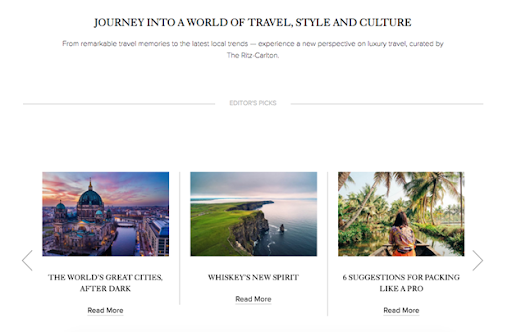
Image Source: Journey The Ritz Carlton
Similarly, The Journey (The Ritz Carlton’s blog) offers insights into the latest travel trends from a well-rounded pool of travel writers. The brands offer a variety of advice on travel topics, from how to pack your bag to tips for every destination you can possibly imagine.
As you can see, all of the most trusted hospitality companies have already tapped into the power of content and used it to establish credibility.
Now it’s your turn.
Boost your sales by revealing just how authoritative, smart, and helpful your brand can be for its consumers. Bring in experts for interviews. Share your advice. Answer questions that are relevant to your industry.
Content Is an Excellent Motivator
Last but not least, you must understand that content can be extremely convincing when executed properly. It’s the motivator you need to move people from the “research stage” to the “booking stage” of the hospitality sales journey.
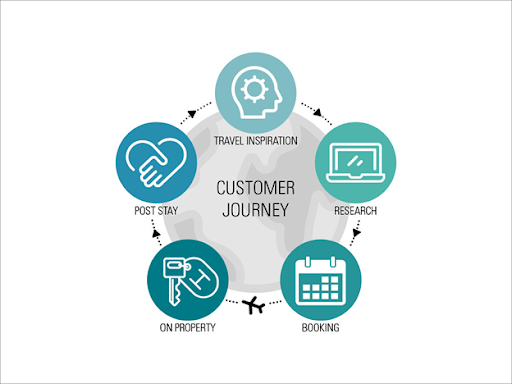
Image Source: GCH Hotel Group
As people begin their purchasing process for any hospitality product, they start with inspiration. This is their interaction with social media, friends and family, and other sources that drive them to consider visiting a certain location.
Then, they transition into the research part of the process. That’s where you bring in the big guns: content that sells.
To show you what we mean, here’s an example situation. Let’s say that you’re considering staying at an eco-friendly hotel. One of your friends did it and said it was fun, so you’re interested in booking your next vacation with a green hospitality company.
However, you aren’t sure, so you conduct some research. That’s when you stumble across this video from Playa Viva, an eco-friendly hotel in Mexico.
Suddenly, you’re feeling a whole lot more convinced that doing environmental work on your vacation is worthwhile, fun, and important. The brand’s description of their process, their activities, and their beautiful video serves as content that really convinces.
Note that the content doesn’t show anything about the brand’s physical appearance. No fancy beds, no expensive cocktails, no waiters or doormen. It focuses on the experience.
That’s what your content needs to do. It should serve as the push that takes people from “maybe” to “yes!” as they enter the booking process.
If you need help brainstorming how to create motivational hospitality content, here are some tips:
- Pick inspirational topics that make people want to take action
- Reveal what unique opportunities your brand offers that others don’t
- Include information on social, economical, or environmental movements
- Make people feel positive about their vacation
Keep in mind that priorities are continuously changing for travelers and patrons, and your content will need to reflect those trends.
For instance, activities and unique experiences have currently taken precedence over nice hotel rooms with 67 percent of high-income travelers. Therefore, in 2020, you’re better off producing inspirational content about adventure and tours than hotel rooms, amenities, and features.
When you play your cards right and create excellent sales content, you stand a much better chance of actually igniting conversions on your website. Don’t be afraid to get creative and spark people’s interest with motivational words, videos, and images.
In Conclusion
Hopefully, over the course of this piece, we’ve revealed how incredibly influential content is when working to increase hospitality sales. At this point in the history of the industry, content really isn’t an option anymore - pretty much every brand is using it, so if you’re not, it’s time to catch up.
Our last piece of advice, to sum it all up: don’t create content just for the sake of creating content.
Produce articles and features that help your consumers - and your brand. Do your best to educate and bond with your consumers via content, and your sales will flourish as a result.
Right now is the time to position yourself as a "trusted advisor" so when the opportunities present themselves, they will naturally think of you to help them solve their problems.
Now more than ever, you must serve before you sell.



